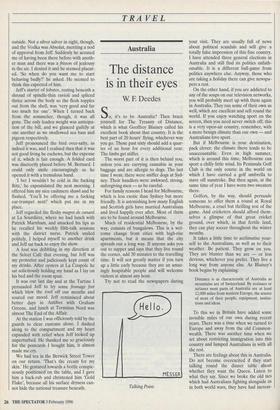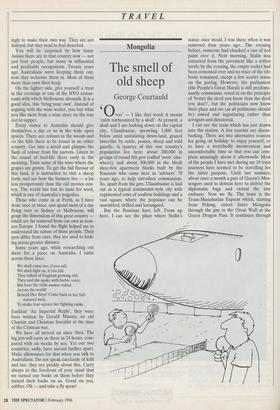Australia
The distance is in their eyes
W E Deedes
So, it's to be Australia? Then brace yourself for The Tyranny of Distance, which is what Geoffrey Blainey called his excellent book about that country. It is the best part of 20 hours' flying, whichever way you go. Those past sixty should add a quar- ter of an hour for every additional year. The limbs get stiffer.
The worst part of it is then behind you, unless you are carrying cannabis in your baggage and are allergic to dogs. The last time I went, there were sniffer dogs at Syd- ney. Their handlers were awkward, strong, unforgiving men — so be careful.
For family reasons I head for Melbourne, which is less exotic than Sydney but more friendly. It is astonishing how many English and Scottish girls have married Australians and lived happily ever after. Most of them are to be found around Melbourne.
Much of residential Melbourne, by the way, consists of bungalows. This is a wel- come change from cities with high-rise apartments, but it means that the city spreads out a long way. If anyone asks you out to supper and says that they live round the corner, add 30 minutes to the travelling time. It will not greatly matter if you turn up a little early because they are an amaz- ingly hospitable people and will welcome visitors at almost any hour.
Try not to read the newspapers during Talking Point. your visit. They are usually full of news about political scandals and will give a totally false impression of this fine country. I have attended three general elections in Australia and still find its politics unfath- omable. It is a different ball-game from politics anywhere else. Anyway, those who are taking a holiday there can give newspa- pers a rest.
On the other hand, if you are addicted to any of the soaps on our television networks, you will probably meet up with them again in Australia. They run some of their own as well, which are excellent and sell round the world. If you enjoy watching sport on the screen, then you need never switch off; this is a very open-air country, remember, with a more benign climate than our own — and Australians love sport.
But if Melbourne is your destination, pack clever: the climate there tends to be unaccountable. Even in high summer, which is around this time, Melbourne can sport a chilly little wind. Its Peninsula Golf Club is the only course in the world on which I have carried a golf umbrella to stave off sunstroke. But then again, at the same time of year I have worn two sweaters there.
Golfers, by the way, should persuade someone to offer them a round at Royal Melbourne, a cruel but thrilling test of the game. And cricketers should afford them- selves a glimpse of that great cricket ground, over which, in that fertile land, they can play soccer throughout the winter months.
It takes a little time to acclimatise your- self to the Australians, as well as to their weather. Be patient. They grow on you. They are blunter than we are — or less devious, whichever you prefer. They live a long way from anyone else. As Blainey's book begins by explaining:
Distance is as characteristic of Australia as mountains are of Switzerland. By sealanes or airlanes most parts of Australia are at least 12,000 miles from western Europe, the source of most of their people, equipment, institu- tions and ideas.
To this we in Britain have added some invisible miles of our own during recent years. There was a time when we turned to Europe and away from the old Common- wealth. There was another time when we set about restricting immigration into this country and lumped Australians in with all the rest.
There are feelings about this in Australia. Do not become overexcited if they start talking round the dinner table about whether they want the Queen. Listen to what they say. Since we broke the old ties which had Australians fighting alongside us in both world wars, they have had increas- ingly to make their own way. They are not disloyal, but they tend to feel deserted.
You will be surprised by how many Asians there are in that country now — not just boat people, but many in influential and profitable occupations. Twenty years ago Australians were keeping them out, now they welcome them in. Most of them more than earn their keep.
On the lighter side, give yourself a treat in the evenings at one of the BYO restau- rants with which Melbourne abounds. It is a good idea, this 'bring your own'. Instead of arguing with the wine waiter, you buy what you like most from a wine store on the way out to supper.
Every visitor to Australia should give themselves a day or so in the wide open spaces. There are colours in the woods and on the hills there to be found in no other country. Get into a wood and glimpse the flash of colour from the parrots. Listen to the sound of bird-life there early in the morning. Taste some of the wine where the grapes are grown. To get the full flavour of this land, it is instructive to visit a sheep farm, and see how the farmers live — a lot less prosperously than the old movies con- vey. The world has lost its taste for wool, which is one of Australia's tragedies.
Those who come in at Perth, as I have done once or twice, and spend most of a day flying over to Sydney or Melbourne, will grasp the dimensions of this great country which are far removed from our own in west- ern Europe. I found the flight helped me to understand the nature of these people. Their eyes differ from ours; they are used to look- ing across greater distance.
Some years ago, while researching out there for a piece on Australia, I came across these lines:
We shall come too, if you call, We shall fight on, if you fall.
They talked of England growing old; They said she spoke with feeble voice; But hear the virile answer rolled Across the world!
Behold Her Boys! Come back to her full- statured men, To make four-square her fighting ranks.
Entitled 'An Imperial Reply', they were lines written by Gerald Massey, an old Chartist and Christian Socialist at the time of the Crimean war.
We have all moved on since then. The big jets will carry us there in 24 hours, com- pared with six weeks by sea. Yet our two countries, sadly, have moved further apart. Make allowances for that when you talk to Australians. Do not speak carelessly of kith and kin: they are prickly about this. Carry always in the forefront of your mind that we turned our backs on them before they turned their backs on us. Good on you, cobber. Oh — and take a fly spray!



































































 Previous page
Previous page